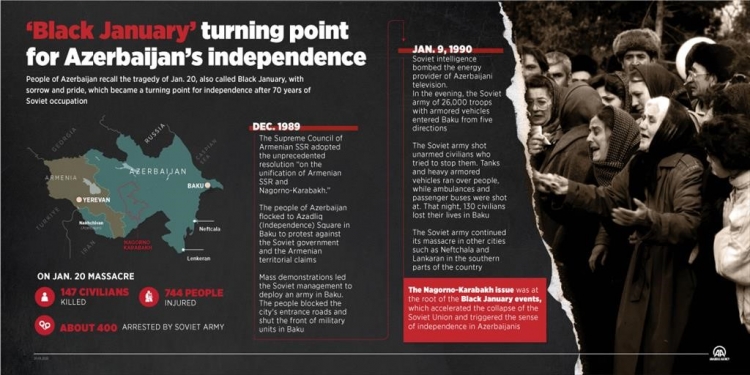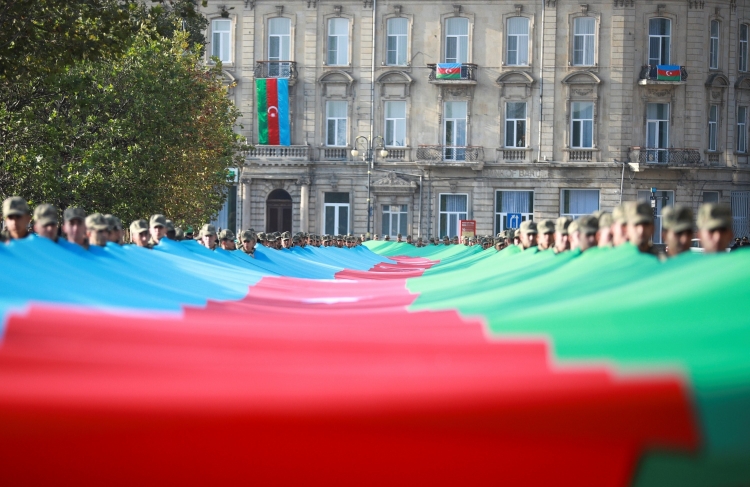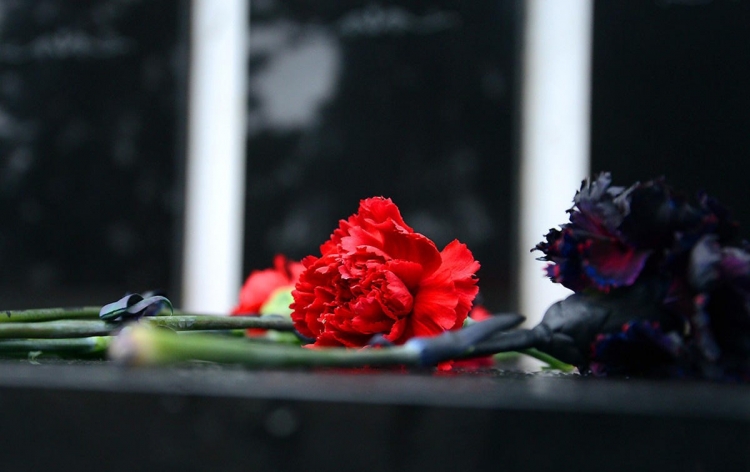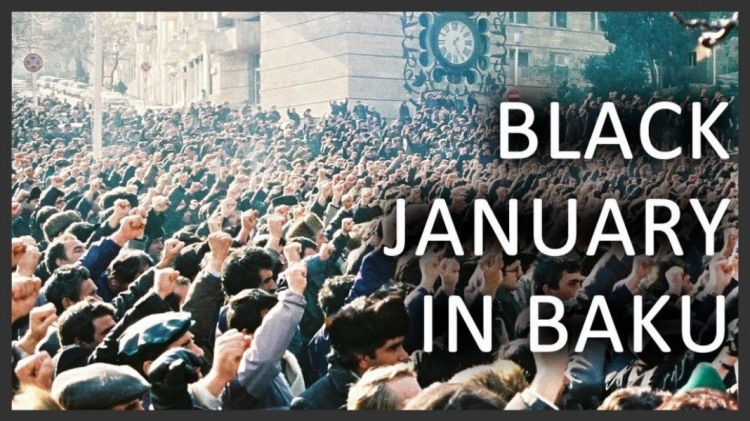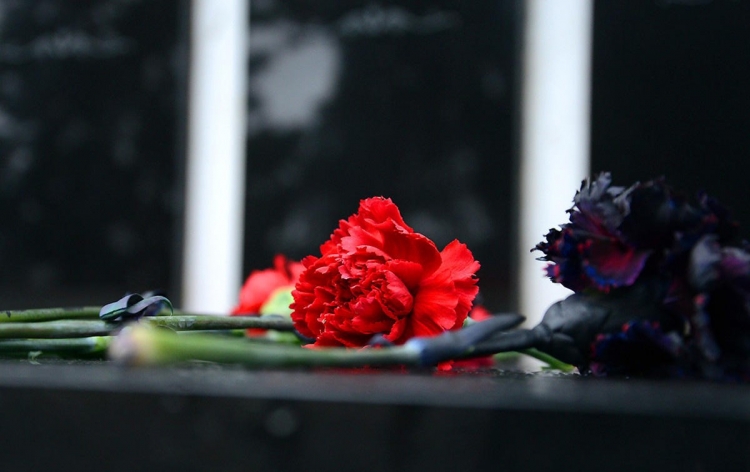
In strategic communication study, “Black” stands for “grief” and “greatness” too and Azerbaijan’s human tragedy of the Black January upholds the both. This year it commemorates its 33rd anniversary with zeal and zenith and respect having pure spirits of nationalism and patriotism.
Human sacrifice and concept of martyrdom has been channelizing human communities, countries and continents to fight against ethnic cleansing, discrimination, genocide and state’s terrorism. In this regard, Black January was not an act of ancient “Geek Human” tragedy but human survival against crimes committed against helpless humans and humanity in the modern times. However, acts of unlimited bravery changed the course of political dimensions and ultimately Azerbaijan succeeded to achieve freedom.
Moreover, Black January represented many unsung heroes who laid their lives for national dignity and honor. Undoubtedly it was the famous battle between pure and simple humanity and perpetual horrendous crimes.
Tragic incident of “Black January” was happened on January 20, 1990. City of Baku was purposefully attacked from all directions. The 26,000 Soviet troops ruthlessly stormed the city and started indiscriminate shooting. A large number of innocent civilians, including children, women and elderly people, were butchered and a thousand wounded in a bloodshed carried out by the heavily-armed soldiers of former USSR.
In the tense war of survival fortunately humanity and human traits became the real victors and unjustified brutal power inflicted with resounding defeat. Black January also portrayed “victory of humanity” over vicious killing, collective determination over indiscriminate cleansing and ultimately Azerbaijanis became victors and forces of evil, darkness and attackers on democratic norms, civil liberties and free will got diminished which shows values of die-hard spirits of “economics of humanity”.
Moreover, the study of human history reveals that its civilization has been praising people’s resistance against cruelty, repression, abuse of authority, tyranny and last but not the least, military aggression since its time immortal and Black January carried the entire human traits belonged to people of Azerbaijan.
Subsequently, people who fight for independence, self-reliance, freedom, liberty, protection of human rights and social justice became larger than life characters in the world and Black January is not exception.
In this regard, people’s massive resistance brought drastic changes in the national histories of various nations and ultimately full independence was achieved. The Republic of Azerbaijan and its people reaffirmed that independence could be achieved through holy martyrdom. Black January is nothing but true reflection of martyrdom by virtue of which it succeeded to achieve full independence afterwards.
Strong resistance of Azerbaijan people defeated the unbridled tanks. Bullets became ineffective against true brotherhood. Ammunition was defeated against ethnic diversity of Azerbaijan’s multiculturalism. Helicopters failed to demoralize hopes of brave people. This massacre achieved nothing but greater regional isolation and international condemnation for former USSR.
Human die hard spirits protected the city Baku which remained under attack and siege and ultimately the forces of Soviet Union had to leave the city. Subsequently, Azerbaijan declared independence on October 18, 1991. With the Decrees of former President of Azerbaijan Heydar Aliyev of December 16, 1999, all the victims of the crackdown were awarded an honorary title of the “Martyr of January 20.”
Black January was the prime example of human nationalism, patriotism, determination, dignity and self-respect and courage to fight against all odds to achieve ultimate goal i.e. independence. Black January was not mere eleven words. It was bloodbath of common Azerbaijanis who did not bow against military might of Soviet Union and ultimately perpetual coercion was badly defeated. Black January stood for Azerbaijan’s rich ethnic diversity wherein Muslims, Christians and Jews laid their precious lives to defend the motherland. Black January proved to be first step towards complete independence. Martyrdom has multiplier effects because it involves divine blessings as well.
The brutal regime utterly failed. After the massacre, tens of thousands young and old, men and women, Muslims, Jews and Christians gathered in the streets to mourn the victims, and announced a general strike in honour of the dead souls, shut down the city for 40 days.
Heydar Aliyev, the founder of the modern Azerbaijan, came to the Azerbaijan SSR’s office in Moscow and fiercely denounced the bloodshed. His defiance helped to inspire the Azerbaijani people and Heydar Aliyev became a leader of the struggle for liberty. The force could not stop the people of Azerbaijan from seeking their freedom. In fact, it only increased their resolve to re-establish a free and independent Azerbaijan.
Black January reflected sorrow as well as Azerbaijanis strength, struggle and success against all odds. The Soviet leadership ordered some 26000 troops with heavy military equipment to storm the city of Baku in an operation called “Strike” during which humanity was “bleed” and “beasts” were everywhere in the city but it could not strike-down the true spirits of interfaith harmony, patriotism, national pride and communal unity and people having diversity of faith, belief and origin stood fast to fight against all odds.
Black January carried “tragedy” too but it transformed outlook of Azerbaijan after which dreams of “qualitative life”, socio-economic prosperity, modernity, and smarter economy became reality and now, the Republic of Azerbaijan holds 75-80 percent of GDP of South Caucasus,”. Since the restoration of independence, Azerbaijan has achieved immense economic development, social compatibility, civil superiority and energy diversity. Its strategic Road Map for socio-economic development has further consolidated its position in the region and beyond. Fortunately all illegally occupied areas have been regained from Armenia.
Baku, the city of fire which resounded to the sound of gunfire in Black January, now resounds to the sound of construction as the city is transformed into a vibrant and modern outlook. Azerbaijan has become leader of cultural diplomacy, icon of multiculturalism, sign of Islamic values, and place for peaceful co-existence in the world. The streets down which Soviet tanks had once driven were filled with foreign tourists and journalists eager to see the sights of Baku. Black January 1990 was a paradigm shift for Azerbaijan in all respects.
Helsinki Human Rights Watch revealed the Soviet brutality of January 20, 1990 during which army intentionally crashed unarmed peaceful civilians under their tanks. Medical personnel, ambulances and even hospitals were specifically targeted. Hundreds of civilians were killed, including children, women and elderly; people of different ethnic and religious backgrounds, Muslim, Christian and Jewish. The soldiers sacked and burnt 200 houses and apartments, 80 automobiles, including ambulance cars, the state and personal property. It was an act of state terrorism and crime against humanity.
Black January was indeed marked the beginning of the end of the Soviet rule in Azerbaijan, and eventually caused cracks in the foundations of the Soviet statehood. Millions of Azerbaijanis and friends of Azerbaijan visit Martyrs’ Alley in the Azerbaijani capital Baku every year to pay tribute to the memory of the victims who laid down their lives for the country’s independence.
Martyrs of Black January 1990 are real heroes and sons of the motherland, “Azerbaijan” which defended the freedom and independence of Azerbaijan with their bravery and became “larger than life characters”. Martyrs are still alive in shapes of Azerbaijan’s “irrevocable independence”, “uncompromising sovereignty”, “and sustained socio-economic prosperity” and the last but not the least, “unbending national pride”.
I personally believe that military operation of January 1990 was totally planned and a calculated act. It took its roots back to 1988. As the Soviet Union rapidly withdrew its forces from Eastern Europe, the spill-over from the 1989 upheavals began muffled throughout the Soviet Union. Black January was the continuation of Soviet attacks on civilians in Almaty & Tbilisi, in 1986 & 1989 respectively, and followed by use of force in Vilnuis, Lithuania.
Various research studies, papers, essays of magazines and journals and news items clearly reconfirmed before Black January terrible incident political parties/bodies and Azerbaijani Supreme Soviet was paralyzed. Weapons were gathered from militia employees under the pretext of population disarmament.
Flows of information were stopped and Soviet authorities blocked of televisions and stopped the broadcasting in Azerbaijan on January 19 in order to deprive population from getting information. Foreigners were not allowed to enter to the city. Western reporters were banned from traveling to Baku to cover the events.
Soviet Defense and Interior Minister, and military officials reportedly visited Baku some days before, for realization of this calculated terrorist attack. Soviet reservist, which was prepared for the special mission, had been mobilized and sent to the region exactly for fighting. Most of the Soviet militants were the orphan people prepared for the special mission.
Black January was the “turning point” for all the Azerbaijanis people who abandoned Soviet identity and becoming citizens of the independent Republic of Azerbaijan at the time when such independence still seemed unreachable. Black January also upholds “grief” which has enduring human befitting propositions. It united the people of Azerbaijan despite ethnic diversity and strengthened their resolve to achieve that independence.
Human blood is a scared commodity and innocent martyrdom never dies. It is a special blessing of the creator. It dominates over destruction and destructive forces. It controls over coercion. It strengthens people’s resolve and purifies their needs and dreams. Martyrdom is the path towards eternal happiness and harmony, purity and progress, security and economic sustainability, dignity and development, greatness and growth and above all humanity and hope. Black January highlights the height of human sacrifices of people of Azerbaijan.
Dr Mehmood Ul Hassan Khan
Executive Director: The Center for South Asia & International Studies (CSAIS), Islamabad
Regional Expert: Azerbaijan & South Caucasus
